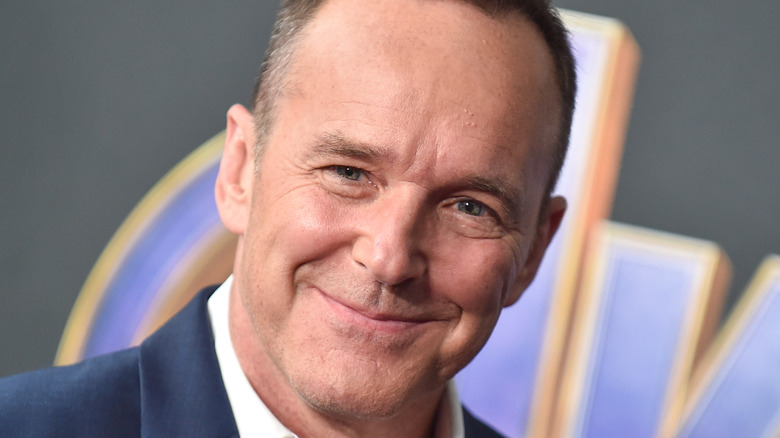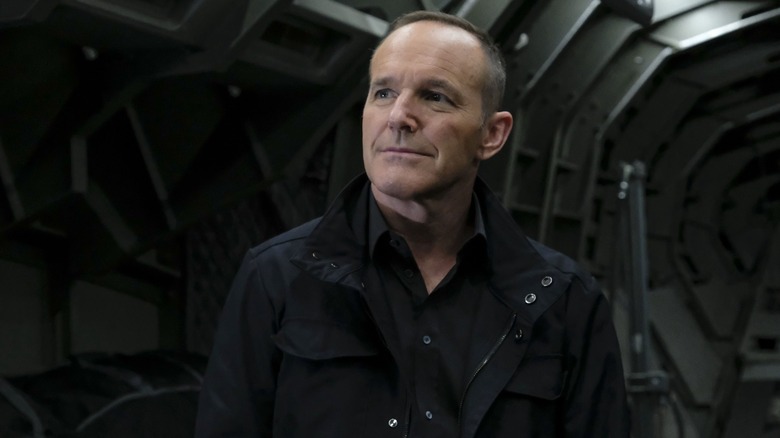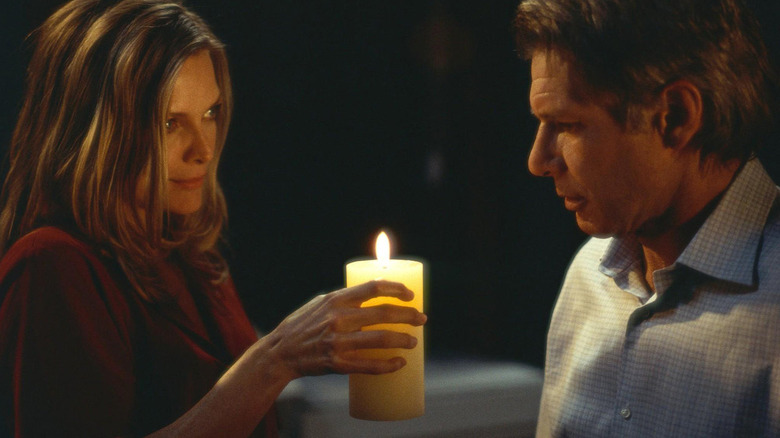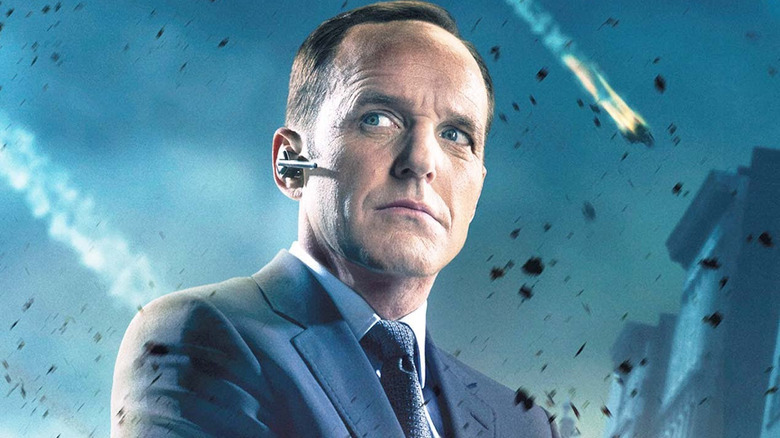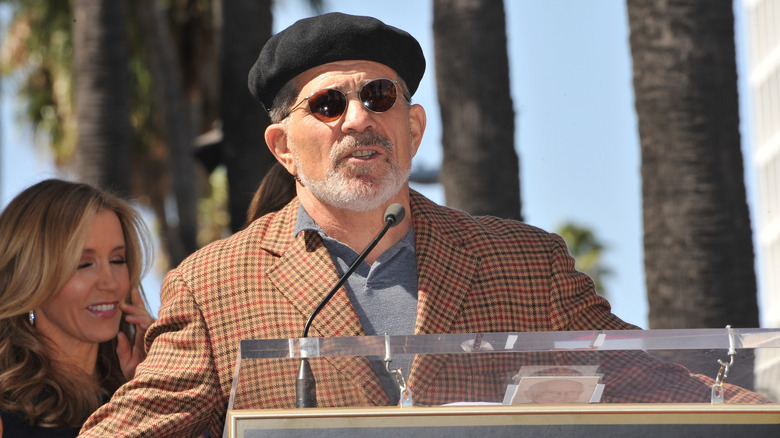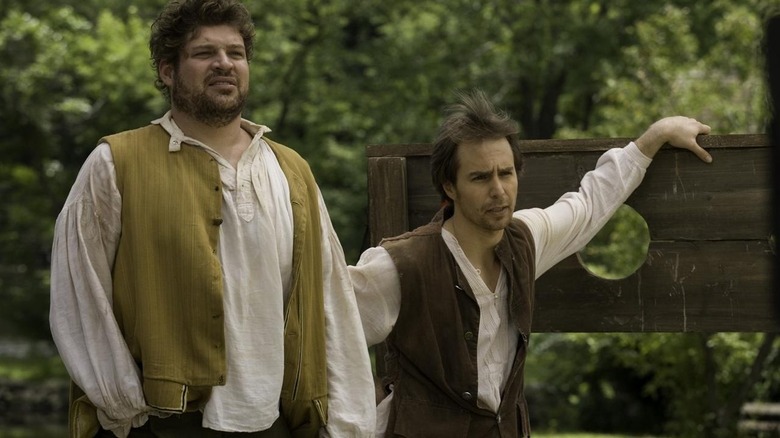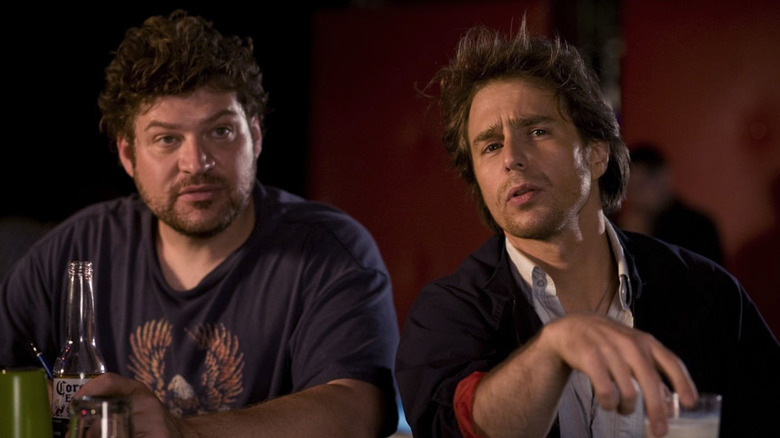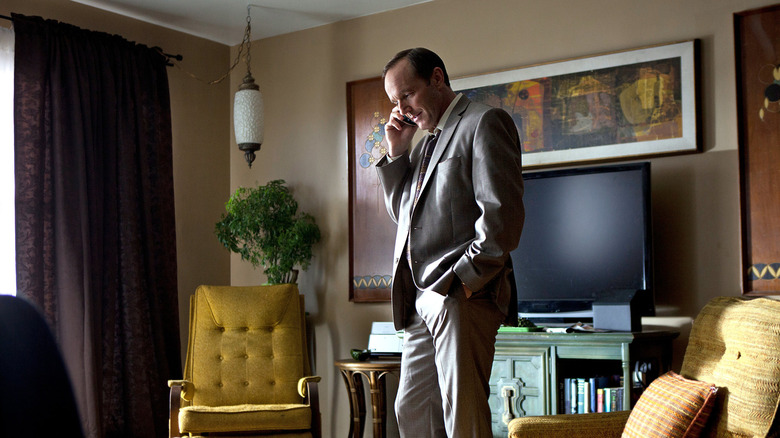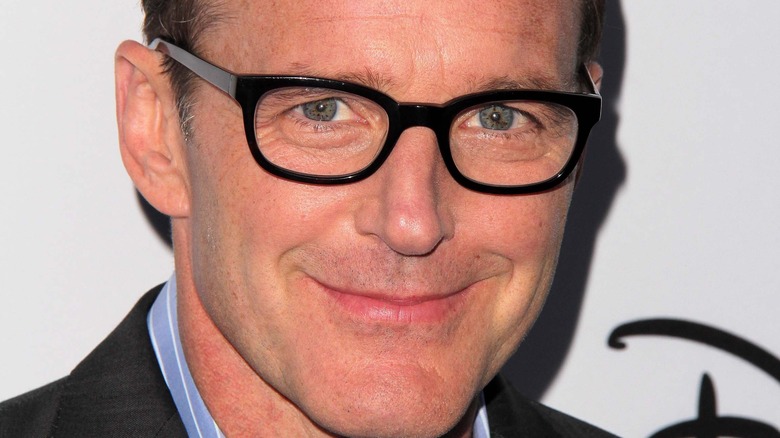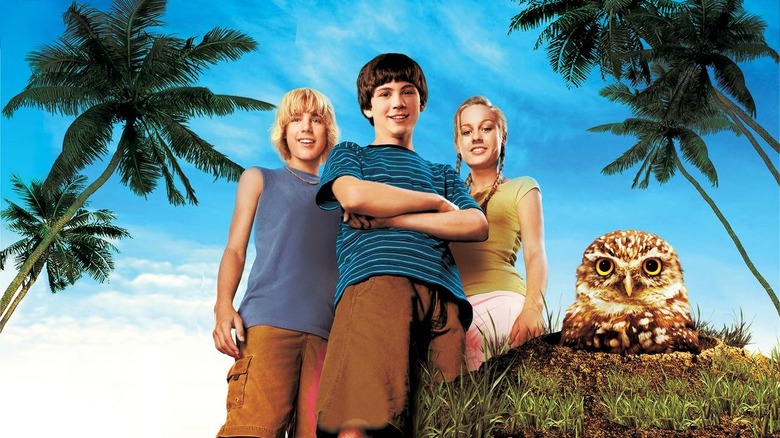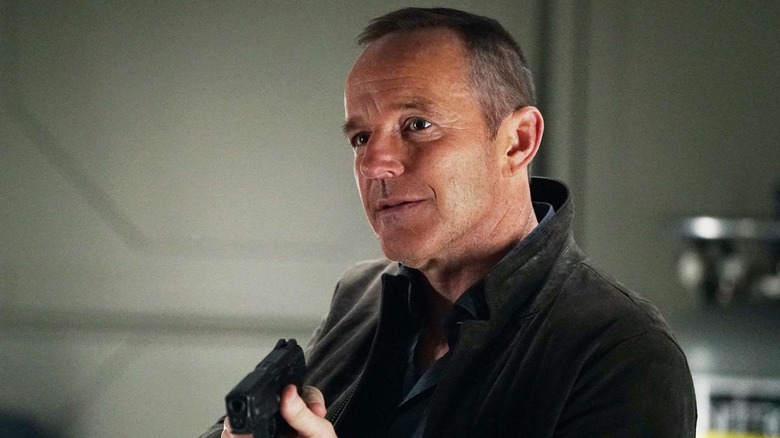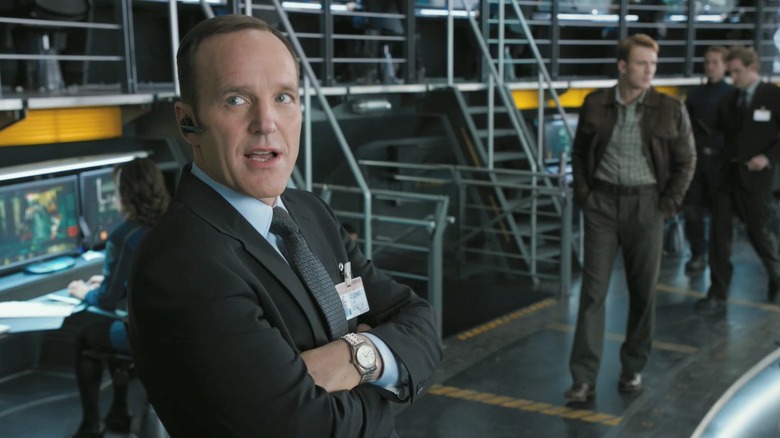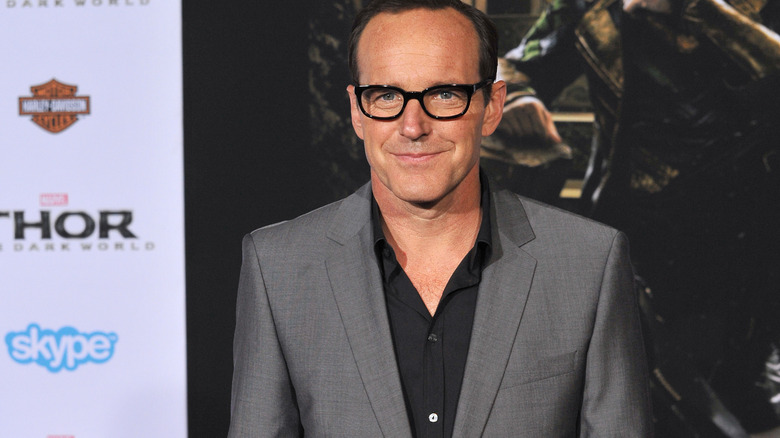The Untold Truth Of Clark Gregg
If you see a photo of Clark Gregg, chances are your mind will immediately associate him with his work in the Marvel Cinematic Universe as S.H.I.E.L.D. agent Phil Coulson. Initially just a supporting figure in "Iron Man," Gregg served as a persistent part of Phase 1 of the MCU. This culminated with his memorable turn in "The Avengers," where he provided an endearingly everyday counterweight to the super-powered stars of the feature. Since then, Gregg has appeared in an assortment of further MCU productions, including headlining the TV show "Agents of S.H.I.E.L.D."
Despite his ubiquity in this franchise, Gregg, of course, isn't just Phil Coulson. This fact is reflected in the untold truth of Clark Gregg, which encompasses his wide array of artistic pursuits as a performer. These include his experiences working as a director on independent features, how he managed to write the screenplay for a hit Robert Zemeckis directorial effort, and his love for stage acting. Gregg's most famous role may be as the upbeat Coulson, but it's crystal clear that Gregg is far more than just that Marvel Cinematic Universe staple.
When he believes Agents of S.H.I.E.L.D. found its creative stride
"Agents of S.H.I.E.L.D." was never critically reviled but it did take a while for it to garner up the fanbase that still rallies around the program today. Even its leading man, Clark Gregg, has been open about the show needing some time to find its sea legs. For Gregg, however, it's obvious when "Agents of S.H.I.E.L.D." really hit the ground running as a special piece of television entertainment.
"I think in the early days it was very much an experiment and honestly, Marvel was really one big company ... and there was a real desire to thread very carefully what we were doing with the movies," Gregg told Gizmodo. "You know, at the end of Season 1 with the Hydra reveal in 'Captain America: Winter Soldier,' it turned our show upside down. But I think when the show started to really find its best stride was when our writers decided, 'Eh, screw it.' We're going to take what we can get and there's a lot of stuff [Marvel Studios] doesn't seem to be using. They don't seem to be using L.M.D.s, they don't seem to be using Ghost Rider or the Framework ... They've ingeniously taken the parts of the Marvel universe — which is broad — that no one seemed to be interested in, and we've squeezed every drop out of them and really let our train go on its own track."
How Gregg helped write What Lies Beneath
Clark Gregg's exploits in Hollywood don't just include acting and directing. He's also a screenwriter, with perhaps his biggest credit being his work on the script for "What Lies Beneath." This 2000 Robert Zemeckis feature was a box office hit, but Gregg's script for "What Lies Beneath" had humble beginnings. "So, I started writing, 'cause I needed to be busy," Gregg told ComicBook.com. His work on some independent screenplays got the attention of an executive at DreamWorks Pictures, who subsequently assigned Gregg to write what would become "What Lies Beneath."
"We talked about it for a while and they sent me off and I wrote a script, and the first draft turned out okay," Gregg continued. "And I guess DreamWorks had a deal with Rob Zemeckis and weirdly, I guess, he ... said, 'You know, what I really wanna do is kind of a Hitchcock, Hitchcock-ian ghost thing.' And they were like, 'Okay, that's weird.' One could describe this kind of beginnings of a script here in that way and the next thing you know, I was meeting with the legend at his place out near Santa Barbara at the time. He just was remarkable and had really amazing ideas, and wanted to work on it with me and keep me around." Through that process of collaboration, a hit screenplay and Gregg's breakthrough into filmmaking were both born.
How he realized Coulson would be a long term role
While Clark Gregg's Phil Coulson is now one of the more recognizable staples of the Marvel Cinematic Universe, he wasn't always destined to be such a prominent part of this franchise. Starting as just another supporting character in the very first "Iron Man" movie, Coulson would eventually evolve into someone much more complicated and important. This evolution would culminate in this seemingly throwaway figure getting to headline his own TV show, "Agents of S.H.I.E.L.D."
Despite the MCU being famous for its detailed planning, discovering just how integral his role would be to the overall mythos was not something Gregg realized all at once. "No, it was so gradual," Gregg told ComicBook.com about understanding Coulson's long-term importance. "It was so a series of moments, from being kind of pulled aside on 'Iron Man 1' and being told that they were adding more scenes and kind of making it clear that this guy was really a little bit more intimidating and in possession of more secrets than he's masquerading as at the beginning. And then, being added to 'Iron Man 2,' I thought, "Well, that's cool. That's cool, he has another scene."
Of course, Gregg's stint as Coulson would stretch far beyond "Iron Man 2" and into parts he could have never imagined when he first signed on for that original "Iron Man."
Being directed by David Mamet
Just a few months before the final season of "Agents of S.H.I.E.L.D." hit the airwaves, Clark Gregg returned to the world of theater to work with one of the most prolific figures in the field: David Mamet. Gregg was set to perform in Mamet's new play, "The Christopher Boy's Communion," just days before the coronavirus (COVID-19) pandemic shut down all live theater work in Los Angeles and around the globe. Before that seismic event, however, Gregg was hesitant to discuss the details of the show and Mamet's plans for it.
"He doesn't want to give up anything people are going to see," Gregg said to Broadway World. "Even the writing of the play, he has an aesthetic that really involves not condescending to the audience. This piece is nothing like I've acted on stage. He really lets the audience put the pieces together by just watching what's going on. There's no exposition."
Despite all the concealed details, Gregg did find it exhilarating to return to the stage. "Incredibly fun," Gregg said in describing the rehearsal process for the show. "A moving piece with the funniest humans alive. A lot of laughing in between heavy stuff. Been working on television, haven't done a play five or six years. Just really nice to be in a rehearsal room among friends."
The process of directing his first movie
Clark Gregg's most famous artistic pursuits have been in the MCU, but Gregg also has a storied history in the world of indie cinema. This includes directing the 2008 feature "Choke," which saw Gregg stepping behind the camera for the first time. Rather than just act like a veteran who always knew the score, Gregg has been open about the countless surprises that awaited him in making his directorial debut.
"It was remarkable," Gregg explained to SlashFilm. "It defied expectations at every turn. A lot of things were as I thought they might be, having watched stuff be filmed and having written stuff that was filmed, and other things were completely different. Beforehand it was a lot of wondering what I didn't know. I felt there were certain things you could study and prepare for both with specific regard to this story and this script but also in terms of taking whatever skill set I had as an actor or theater director or screenwriter and augmenting them with whatever visual acumen I might need." These experiences sound far from predictable but they reinforce the endearingly ramshackle nature of Gregg's more low-budget artistic pursuits.
Gregg's biggest challenge in directing Choke
Ask any filmmaker and they'll tell you an indisputable truth: no movie is easy to make. Every project has its pitfalls, its hardships, those moments where it looks like everything is falling apart. That's especially true when you're directing your first feature-length endeavor, a daunting task for anybody. For Clark Gregg, helming his directorial debut, "Choke," provided its own unique set of obstacles to overcome.
"It was interesting to see that the greatest threat to the realization of the risky material came not from the censorship I had feared, but from the pervasive compromise required by the limited budget," Gregg explained to IndieWire. "Those difficulties were felt every day in every department. I should say, however, that those difficulties have been a factor on every indie I've ever been involved in, and fortunately for me ... proved invaluable when it came to finding cheaper alternatives that still achieved the necessary creative objectives."
Every movie has its difficulties in coming to the screen, but directors like Gregg who can roll with these challenges ensure that these productions aren't solely defined by their most difficult moments.
What it was like to direct and act on Trust Me
While Clark Gregg's directorial debut, "Choke," starred Sam Rockwell, his follow-up feature, the showbiz satire "Trust Me," actually featured Gregg in the lead role. The process of starring in a movie you're also directing is a daunting one that many artists have opted to avoid entirely. For Gregg, though, he decided to embrace the risk and the hardships inherent in tackling both duties.
"The most challenging part was trying to direct myself and act while I was also directing," Gregg recounted to Hypable. "It wasn't something that I necessarily aspired to, but there was something about the finished script, and this character, that kind of connected with me on a deep level. And that was probably the rewarding part, was realizing that for whatever I had sacrificed in not giving away one of those jobs to somebody else, I had gotten something back in return. [It] was kind of a terrified momentum ... which [worked perfectly] for the character." Channeling the inherent nervousness over directing and starring in one movie into the mindset of his "Trust Me" character turned out to be an incredibly useful tool for Clark Gregg.
He's learned to stick to the unorthodox
How do you keep your creative spirit burning for years on end? When you've been in the film industry for as long as Clark Gregg has, what do you do to make sure you don't just end up phoning it in and giving up on the ambitions that define the best artists? Well, in directing something like "Trust Me," Gregg is open about his willingness to embrace the unusual when it comes time for him to step behind the camera.
"There was a lot of people who wanted me to fit ['Trust Me'] into a box that was more comfortable for them — financiers, different artists who were considering working on it," Gregg said to Hypable. "And again and again, I chose not to, especially in the spirit [of the fact that] it felt ludicrous to me to do something for no money and pour your heart into it, and at the same time sell it out and try to make it fit into a commercial model where it was safe ... it may not work, but it's certainly going to lead you to growth." Embracing those bold swings inevitably helps keep the embers of creativity burning.
Clark Gregg worked with Brie Larson long before Captain Marvel
For many moviegoers, "Captain Marvel" was the first time they ever saw Clark Gregg and Brie Larson interact. In actuality, the pair crossed paths more than a decade prior in a movie significantly smaller in scale than the first blockbuster headlined by Carol Danvers. The project in question was the 2006 kids movie "Hoot," in which a group of kids decide to protest a construction project that threatens the lives of a bunch of burrowing owls. The film was not a box office hit, grossing just $8.2 million worldwide on a $15 million budget, a sharp contrast to "Captain Marvel's" massive box office haul. However, that lackluster financial performance didn't hinder the admiration Gregg has for Larson as a performer.
"She's amazing. I mean you know, everyone knows she won an Oscar, and she's really special," Gregg told ComicBook.com about Larson. "We did a movie together when she was 15 called 'Hoot' ... I guess that was almost 15 years ago, and I'm so proud of her. What she's done, she's become one of I think our best actresses." Nobody involved in the filming of "Hoot" could have ever predicted how two of its performers would eventually reunite more than a decade down the road.
Clark Gregg would love to direct a Marvel movie
Clark Gregg has spent so long in the Marvel Cinematic Universe that he's managed to do more than just act. He's also taken to directing a handful of episodes of "Agents of S.H.I.E.L.D." That's a significant leap that few other actors in this property have managed to make. However, if Gregg had his way, he'd be able to go one step further and helm one of the motion pictures in this long-running franchise.
"Yeah, I've thought about it more than they have," Gregg said to Collider about the concept of directing a Marvel movie. "I would really be into it. I certainly watch what Ken [Branagh] and Jon Favreau do, in terms of the scope and the visual effects, and I'm fascinated by it. I feel like there's probably one that's more charactery and smaller, that I'd love to get a crack at, at some point. I want to just show up with a spec script for one of my favorites of their heroes and go, 'What do you think?'" While Gregg hasn't landed one of those high-profile gigs yet, one can never rule out anything when it comes to the Marvel Cinematic Universe.
The creative freedom of playing Phil Coulson
Unlike the majority of characters in the Marvel Cinematic Universe, Clark Gregg's Phil Coulson did not originate from the pages of Marvel comic books. Instead, he was an original creation first made for the 2008 movie "Iron Man." Proving popular and narratively useful there, he proceeded to appear in further MCU movies as well as "Agents of S.H.I.E.L.D." Across all these appearances, the fact that Gregg doesn't have any comic book source material to lean on hasn't bothered the performer at all.
"One of the many cool things about my job is that Agent Coulson is about the only character that is not in the comics," Gregg explained to Collider. "There is free license there. He is whatever they want to evolve him to be, and I'm lucky because they've found out that they need somebody who's connected to the real world, to help bring all these characters together."
With all that creative flexibility, Gregg even noted that he's been able to incorporate his own ideas into how Coulson might respond or behave in certain scenarios. With this blank canvas to work with, Gregg and the filmmakers behind these blockbusters have been able to mold Phil Coulson into one of the most beloved characters of the entire Marvel Cinematic Universe.
The world of theater led Gregg to cinema
Clark Gregg did not start his artistic pursuits in the world of film. In fact, before he was a film and television actor, as well as an occasional filmmaker, Gregg developed a strong commitment to the world of theater. "I fell in love with theater first," Gregg reminisced to IndieWire. "After college I co-founded New York's Atlantic Theater Company with friends and remain involved to this day. A first principle at Atlantic was the idea that the company members do everything ourselves — act, write, direct, build sets, hang the lights. I first directed plays there and loved it."
While the experience of rubbing shoulders with an Avenger or directing an independent drama is starkly different from working on the stage, Gregg has been open about how much his theatre work influenced his later creative work. "Working on a play allows you to watch the story from beginning to end each night in front of living, breathing bodies," he explained. "When you can actually feel the audience holding their breath or snoring or laughing or not, it's difficult not to learn something." Given the amount of success Gregg has had in his various artistic pursuits throughout his career, it's clear he took the right lessons from those instances of audience engagement.
